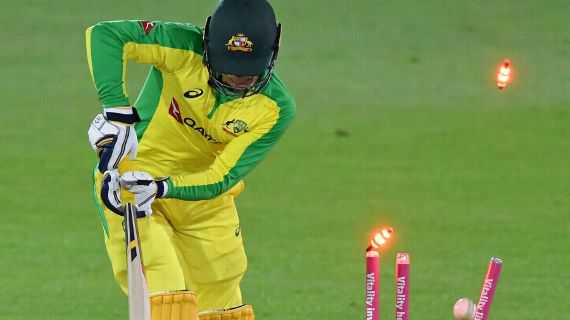Aaron Finch and David Warner accept blame for failed chase but Australia's middle order exposed
05 September, 2020

David Warner and Aaron Finch accepted the blame for not to be able to take Australia over the line in the opening T20I at the Ageas Bowl, but the startling collapse renewed the give attention to their middle-order which includes been the one section of the team to struggle when needed.
After an opening stand of 98 in 11 overs, Australia's equation came right down to 39 off 35 balls - seemingly a canter with Warner and Steven Smith going well - but Adil Rashid struck twice in his last over, the next scalp when Glenn Maxwell opted never to see out the legspinner, and the recalled Marcus Stoinis laboured to find the rope.
The ultimate six overs of Australia's chase brought just one single boundary when Stoinis were able to heave Tom Curran over long-off within the last but he was then unable to scramble the nine needed off the ultimate four balls.
The limp end had echoes of Australia's only other recent T20I defeat against South Africa, at Port Elizabeth, when they couldn't chase 160 despite being 98 for 1 in the 13th over with Warner and Smith set. On that occasion, Warner was left stranded as the middle-order managed simply a single boundary between them. This time Warner was the main collapse when he was cleaned up giving himself room to a Jofra Archer yorker.
"We pride ourselves on being there towards the end," Warner said. "We speak about one batter being there and in, and another guy comes in and tries to take those calculated risks - and we bat to the end. If you get a good delivery you can't do anything about any of it but that's what we pride ourselves on and that is basically what our game is built around."
Finch defended the shot collection of Smith, selecting deep midwicket, and Maxwell who slammed a drive to cover in Rashid's final over.
"These were both playing to a gameplan, so I think if you can separate the execution and the gameplan, you can look a little deeper involved with it," he said. "T20 games are about making sure you undertake your alternatives and matching that up with the right gameplan so there's plenty to work on. I'd oftimes be more critical of myself and Davey, who got us off to good start and neither folks really kicked to have a match-winning contribution."
While Australia had won seven of their eight completed T20Is last season against Sri Lanka, Pakistan and South Africa, the middle-order was not overly tested throughout that period as a result of success of the very best three. However, the defeats here and at Port Elizabeth in February highlighted that it's the weakness of the side.
"We knew that England were likely to keep coming hard plus they executed effectively," Finch said. "We just struggled to obtain the boundary a bit in that 12-18 over mark. That's something to keep focusing on and that's not the 1st time it's happened, so as long as the boys keep learning and improve at it, lesson learned."
It is notable that the top score of a batsman at No. 4 to No. 8 in that period - those that could be viewed as having to finish an innings in a number of conditions - was Smith's 30 off 15 balls when he was pushed right down to No. 5 against South Africa in Cape Town.
There has also been an acceptable turnover of players in those positions including Ben McDermott, Ashton Turner, Matthew Wade and Mitchell Marsh. The latter two are part of this tour but were the players to create way in this match for the return of Maxwell and the slightly surprising recall of Stoinis.
Two days prior to the series, coach Justin Langer had said that he saw Stoinis as having to force his in the past into the side near the top of the order which is where he previously a prolific Big Bash last season but in the finish he returned at No. 5.
"I think we just have to try to be considered a little bit smarter and workout how we're going to hit our boundaries," Warner said of the failed chase. "We have to make an effort to keep rotating strike and keep locating the boundary in those middle overs."
However, after that which was their first international for a lot more than six months, Finch had not been too downbeat despite having seen the opening match slip from Australia's grasp.
"There was plenty of stuff to maintain positivity about. When you can separate the effect and just consider it at individual points, I believe there was some great stuff. Obviously it could have already been ideal to overcome the line, but England certainly are a bloody good side.
"You look at how they went approached their middle overs as well plus they were quite one-dimensional with how they went about any of it, but it was a simple plan plus they executed it that was the main thing. We had a few good hit-outs against one another however when you pull on the colours against England, it's a different thing."
Source: www.espncricinfo.com
